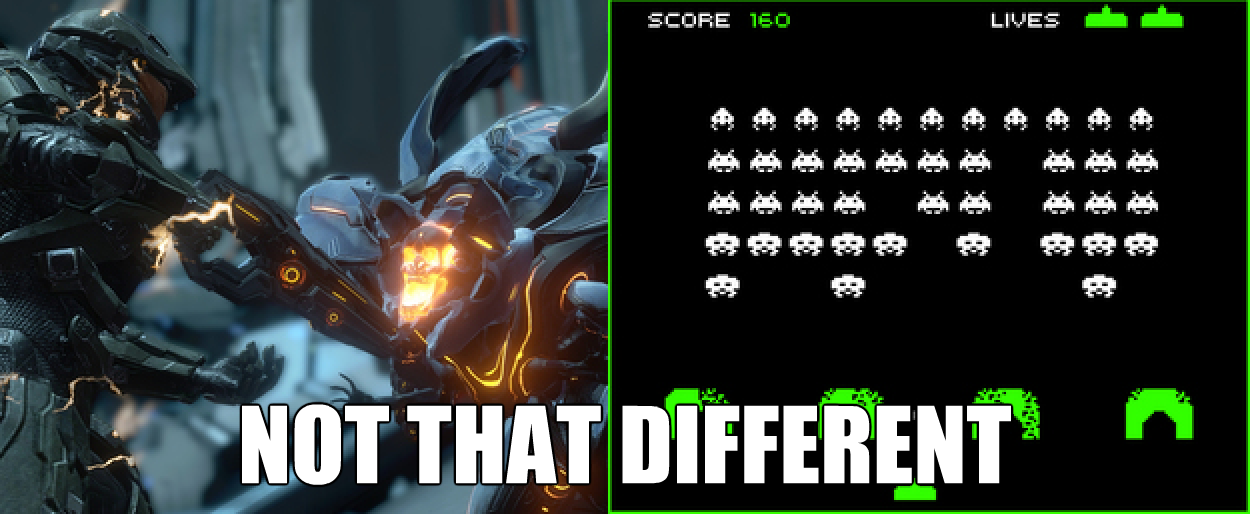GR Showdown pits the Game Revolution staff against each other in a passionate debate on a particular hot-button gaming topic. Our self-imposed rules? There is no middle ground—all must take a side. All debates will have an equal number of representative on both sides: either 1-on-1 or 2-on-2 . And all our arguments must be made in 350 words or fewer; 500 or fewer, if it's 1-on-1. Which side are YOU on?

 Nick Tan – Yes: My first inclination is to be the rebel and say that all of the flame-bait articles comparing PS4 and Xbox One screenshots (you know, they're going to get over 1000 degrees on N4G, right?) are meaningless. Why bother with graphics when so many other things like DRM matter more to consumers. But that's the rub: They apparently do matter. Better to accept it and understand the reasons why.
Nick Tan – Yes: My first inclination is to be the rebel and say that all of the flame-bait articles comparing PS4 and Xbox One screenshots (you know, they're going to get over 1000 degrees on N4G, right?) are meaningless. Why bother with graphics when so many other things like DRM matter more to consumers. But that's the rub: They apparently do matter. Better to accept it and understand the reasons why.
Graphics matter because our eyes matter. If by chance multiplatform games are generally better rendered and modeled, have a more consistent and higher frame-rate, and have fewer graphical glitches on one platform over another, that can make the difference between which version of the game consumers will purchase. Hardcore gamers, despite our misgivings about one platform or another, are the crowd with the higher likelihood to own multiple consoles, so graphics are worthy of consideration.
If Sony's claim that the PlayStation 4 has stronger graphical capabilities than the Xbox One turns out to be true—and third-party developers notice and acknowledge the difference—that's a major boon in the console war. It tells consumers that they are likely getting more bang for the buck in terms of hardware. That's why console specifications are such a hotly debated topic, particularly before both consoles have been released.
An overall impression is what's at stake, a battleground that is contended in a place one might not expect when considering graphics between platforms: exclusives. Though consumers have no other platforms versions to compare them to, there's an underlying, subconscious comparison between one console's exclusives to another's and a graphical impression always comes to mind.
In fact, the real victim in this battle between the Xbox One is the PS4 is the Wii U. One of the main reasons the Wii U will have issues with getting third-party support is merely based on the console's graphical specs to the Xbox One and PlayStation 4. It isn't a fair comparison, but as we head into the next generation, the lack of graphical power on the Wii U will force leading developers to choose whether it's worth the time and money in development to create a Wii U port of an Xbox One/PS4 title that inevitably won't look as appealing to them or to consumers.
Just because graphics may be an overrated factor, by virtue of usually being the first impression we see of a game through screenshots and trailers, doesn't devalue the fact that it is still a factor. Even if one console doesn't win over another in terms of graphical capabilities, the battle will push all developers and lead us to a gaming age closer to photorealism than ever before.

 Daniel Bischoff – NO: This is an argument for the ages, but time will prove me and all the other gamers that get past polygon counts and enjoy great gameplay no matter how they look the victors. Yes, I love high frame-rates, beautifully rendered models, and gorgeous graphical effects like the fluttering disintegration of an enemy blasted with Halo 4's Promethean Scattershot, but in the end it adds little to the gameplay.
Daniel Bischoff – NO: This is an argument for the ages, but time will prove me and all the other gamers that get past polygon counts and enjoy great gameplay no matter how they look the victors. Yes, I love high frame-rates, beautifully rendered models, and gorgeous graphical effects like the fluttering disintegration of an enemy blasted with Halo 4's Promethean Scattershot, but in the end it adds little to the gameplay.
Is Ocarina of Time a lesser achievement in game design because it's dated? Do new machines on the market deflate the mind-bending and engrossing narrative of Chrono Trigger? Are masterfully written text-based adventure games less-than because you have to have reading comprehension to play? It's not that saying graphics matter really deflates older, less advanced experiences like these, but it certainly kicks a little sand in their faces.
It'd be absurd to make the argument that Citizen's Kane's lack of computer-generated imagery immediately negates its artistic and emotional merit, and the same is true of games. As defensive as gamers get in the face of arguments against games-as-art, I think those same individuals grossly undervalue the past in their ever forward march towards ballooning poly-counts and greater development costs.
Spending so much money on graphics capabilities marginalizes the creativity that truly inspired mechanics necessitate. New methods of play and new game ideas require vast amounts of experimentation and admittedly, plenty of room for failure. As hated as the app market seems in core-gaming culture, I'm happy it's here.
iOS and Android titles allow the industry's creative muscle room and freedom to flex. Marching further and further along the path of photorealism isn't just making AAA-development difficult and costly, it's negating the opportunities publishers have to back several different games, as opposed to just one blockbuster for the Fall.
No, I wouldn't want to return to the pre-HD textures, but I still find 8-bit art design attractive and evocative. And while certain genres like simulation sports and racing benefit from near-life fidelity, I think other genres could benefit from stripping the experience down to its barest interactivity and reimagining what defines the gameplay.







